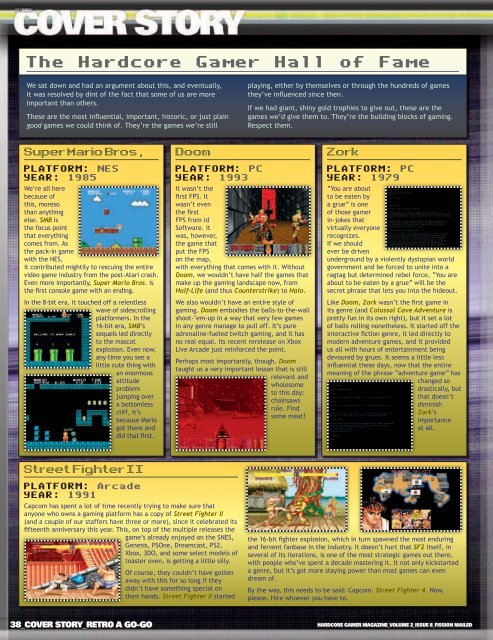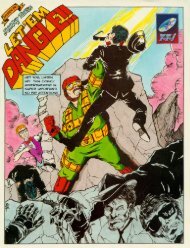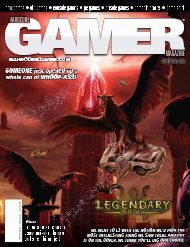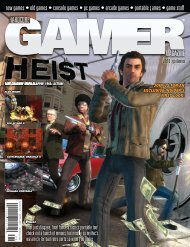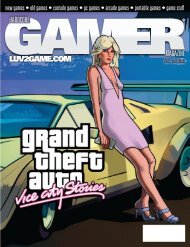Download - Defunct Games
Download - Defunct Games
Download - Defunct Games
You also want an ePaper? Increase the reach of your titles
YUMPU automatically turns print PDFs into web optimized ePapers that Google loves.
The Hardcore Gamer Hall of Fame<br />
We sat down and had an argument about this, and eventually,<br />
it was resolved by dint of the fact that some of us are more<br />
important than others.<br />
These are the most influential, important, historic, or just plain<br />
good games we could think of. They’re the games we’re still<br />
Super Mario Bros.<br />
PLATFORM: NES<br />
YEAR: 1985<br />
We’re all here<br />
because of<br />
this, moreso<br />
than anything<br />
else. SMB is<br />
the focus point<br />
that everything<br />
comes from. As<br />
the pack-in game<br />
with the NES,<br />
it contributed mightily to rescuing the entire<br />
video game industry from the post-Atari crash.<br />
Even more importantly, Super Mario Bros. is<br />
the first console game with an ending.<br />
In the 8-bit era, it touched off a relentless<br />
wave of sidescrolling<br />
platformers. In the<br />
16-bit era, SMB’s<br />
sequels led directly<br />
to the mascot<br />
explosion. Even now,<br />
any time you see a<br />
little cute thing with<br />
an enormous<br />
attitude<br />
problem<br />
jumping over<br />
a bottomless<br />
cliff, it’s<br />
because Mario<br />
got there and<br />
did that first.<br />
Street Fighter II<br />
PLATFORM: Arcade<br />
YEAR: 1991<br />
Doom<br />
PLATFORM: PC<br />
YEAR: 1993<br />
Capcom has spent a lot of time recently trying to make sure that<br />
anyone who owns a gaming platform has a copy of Street Fighter II<br />
(and a couple of our staffers have three or more), since it celebrated its<br />
fifteenth anniversary this year. This, on top of the multiple releases the<br />
game’s already enjoyed on the SNES,<br />
Genesis, PSOne, Dreamcast, PS2,<br />
Xbox, 3DO, and some select models of<br />
toaster oven, is getting a little silly.<br />
It wasn’t the<br />
first FPS. It<br />
wasn’t even<br />
the first<br />
FPS from id<br />
Software. It<br />
was, however,<br />
the game that<br />
put the FPS<br />
on the map,<br />
with everything that comes with it. Without<br />
Doom, we wouldn’t have half the games that<br />
make up the gaming landscape now, from<br />
Half-Life (and thus Counterstrike) to Halo.<br />
We also wouldn’t have an entire style of<br />
gaming. Doom embodies the balls-to-the-wall<br />
shoot-’em-up in a way that very few games<br />
in any genre manage to pull off. It’s pure<br />
adrenaline-fueled twitch gaming, and it has<br />
no real equal. Its recent rerelease on Xbox<br />
Live Arcade just reinforced the point.<br />
Perhaps most importantly, though, Doom<br />
taught us a very important lesson that is still<br />
relevant and<br />
wholesome<br />
to this day:<br />
chainsaws<br />
rule. Find<br />
some meat!<br />
Of course, they couldn’t have gotten<br />
away with this for so long if they<br />
didn’t have something special on<br />
their hands. Street Fighter II started<br />
playing, either by themselves or through the hundreds of games<br />
they’ve influenced since then.<br />
If we had giant, shiny gold trophies to give out, these are the<br />
games we’d give them to. They’re the building blocks of gaming.<br />
Respect them.<br />
Zork<br />
PLATFORM: PC<br />
YEAR: 1979<br />
“You are about<br />
to be eaten by<br />
a grue” is one<br />
of those gamer<br />
in-jokes that<br />
virtually everyone<br />
recognizes.<br />
If we should<br />
ever be driven<br />
underground by a violently dystopian world<br />
government and be forced to unite into a<br />
ragtag but determined rebel force, “You are<br />
about to be eaten by a grue” will be the<br />
secret phrase that lets you into the hideout.<br />
Like Doom, Zork wasn’t the first game in<br />
its genre (and Colossal Cave Adventure is<br />
pretty fun in its own right), but it set a lot<br />
of balls rolling nonetheless. It started off the<br />
interactive fiction genre, it led directly to<br />
modern adventure games, and it provided<br />
us all with hours of entertainment being<br />
devoured by grues. It seems a little less<br />
influential these days, now that the entire<br />
meaning of the phrase “adventure game” has<br />
changed so<br />
drastically, but<br />
that doesn’t<br />
diminish<br />
Zork’s<br />
importance<br />
at all.<br />
the 16-bit fighter explosion, which in turn spawned the most enduring<br />
and fervent fanbase in the industry. It doesn’t hurt that SF2 itself, in<br />
several of its iterations, is one of the most strategic games out there,<br />
with people who’ve spent a decade mastering it. It not only kickstarted<br />
a genre, but it’s got more staying power than most games can even<br />
dream of.<br />
By the way, this needs to be said: Capcom. Street Fighter 4. Now,<br />
please. Hire whoever you have to.<br />
The Legend of Zelda<br />
PLATFORM: NES<br />
YEAR: 1987<br />
Anecdotally, Shigeru Miyamoto based the first Legend of Zelda on<br />
the experiences he had exploring the fields and caves outside Kyoto<br />
as a kid. Along those same lines, every Zelda game since the first one<br />
has provided the player with a vast playground to explore, with little<br />
secrets and side passages to find almost everywhere you look.<br />
Tetris<br />
PLATFORM: PC<br />
YEAR: 1985<br />
This is what<br />
got your mom<br />
interested in<br />
video games.<br />
Maybe she tried<br />
a couple of<br />
Mario games<br />
first, but the<br />
moment she saw<br />
those blocks<br />
falling, she was hooked. She may even still<br />
be hooked to this day.<br />
Tetris is also the game that put the Game Boy<br />
on the map, beginning Nintendo’s dominance<br />
of the portable gaming industry. It started<br />
an argument between Tengen and Nintendo<br />
that ended with Tengen releasing its games<br />
on those characteristic black cartridges that<br />
looked like something out of 2001.<br />
More importantly, it started a seventeenyears-and-counting<br />
trend of not only showing<br />
up on any platform with buttons on it, but<br />
inspiring dozens of falling-block puzzle<br />
games. Some of them have been innovative<br />
and great in their own right, but few manage<br />
to live up to the simple genius of the<br />
original, and few versions of the original are<br />
as good as the version that shipped with the<br />
original Game Boy. At this point, Tetris will<br />
probably<br />
be around<br />
for as<br />
long as<br />
humankind<br />
has thumbs<br />
to play it<br />
with.<br />
38_COVER STORY_RETRO A GO-GO HARDCORE GAMER MAGAZINE_VOLUME 2_ISSUE 8_FISSION MAILED<br />
HARDCORE GAMER MAGAZINE_VOLUME 2_ISSUE 8_FISSION MAILED<br />
Zelda is a fairly obvious candidate<br />
for an article like this just on its<br />
fanbase. A modern Zelda game<br />
occupies a unique niche as How<br />
You Do This Kind of Thing; almost<br />
everything it does (barring the<br />
occasional misfire; Miyamoto’s only<br />
human, after all) is how things ought<br />
to work, from fighting to exploration<br />
to dungeon and setting design. If<br />
every game that came along was<br />
Wizardry<br />
PLATFORM: Apple ][<br />
YEAR: 1981<br />
By the time you reach the end of your life as<br />
a gamer, you will have explored something<br />
like five hundred thousand dungeons,<br />
according to HGM’s Bureau of Impressive-<br />
Sounding Statistics That We Just Made Up.<br />
Wizardry started this tradition off with the<br />
Proving Grounds of the Mad Overlord, and<br />
in so doing, basically created what we now<br />
know as a computer RPG.<br />
Wizardry started many things that we now<br />
take for granted, from dungeon delving to<br />
character creation right down to something<br />
as simple as hit points. You can see its stamp<br />
on every CRPG that’s come out since 1981,<br />
clear as<br />
day, no<br />
matter<br />
where that<br />
CRPG was<br />
developed.<br />
Wizardry<br />
influenced<br />
them all.<br />
half<br />
as<br />
polished as a Zelda game, we would not be able to get anything done.<br />
More importantly, Zelda’s influence wouldn’t really show up in other<br />
games until the last generation. If you sit down and think about it,<br />
The Legend of Zelda is the first “sandbox” game; it allows you to go<br />
wherever you want, and you only need to follow what story it possesses<br />
if you feel like doing it at the time. Whenever you find yourself set<br />
down in the middle of a massive, persistent world, you are, in some<br />
way, back in Miyamoto’s pocket garden.<br />
Metroid<br />
PLATFORM: NES<br />
YEAR: 1993<br />
Metroid arguably<br />
has as much of a<br />
claim to being the<br />
first “sandbox”<br />
game as The<br />
Legend of Zelda,<br />
if not more. The<br />
only thing keeping<br />
it from getting<br />
that position is that it’s essentially meant to<br />
be somewhat more linear than Zelda, and<br />
because it’s had a different effect on the<br />
games that came after it.<br />
It’s a fairly standard gameplay trope at<br />
this point. You start out at the entrance to<br />
some kind of mazelike area — a dungeon,<br />
a mansion, an underground network, you<br />
name it — with no real abilities to speak of.<br />
Everywhere you go, you find obstacles you<br />
aren’t quite equipped to circumvent yet. As<br />
you explore, though, you’ll find well-guarded<br />
items, bits of equipment, or tools that’ll<br />
allow you to overcome what’s standing in<br />
your way. Get a little bit further in, and<br />
you’ll find more obstacles, and more tools<br />
with which to overcome them.<br />
This pattern’s been repeated in countless<br />
games at this point, but Metroid, in many<br />
ways, got there first. It provided a gameplay<br />
model that modern action games are still<br />
using today. The real tragedy here is not<br />
only that Gunpei Yokoi died before he could<br />
have created more<br />
classic Metroid<br />
games, but that<br />
his name isn’t as<br />
well-known as<br />
Miyamoto’s.<br />
RETRO A GO-GO_COVER STORY_39


